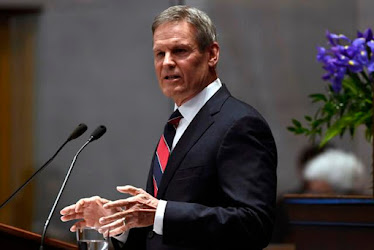 |
| Tennessee Gov. Bill Lee delivers his state of the state address in the House Chamber of the Capitol building Monday, Jan. 31, 2022, in Nashville, Tenn. |
The budget proposal was more than $10 billion higher than the $41.8 billion budget Lee proposed last year during the state of the state.
The state is projected to have more than $3 billion in surplus tax and fees collections this year.
“While Washington saddles our kids with trillions of dollars of debt, Tennessee’s strong fiscal position allows us to instead invest on their behalf,” Lee said. “Education, health care, infrastructure, and economic development – all areas where we can make smart and strategic investments that most states cannot.
“In Tennessee, we’ve also prioritized efficiency.”
Lee adjusted his budget proposal last year with more than $500 million in appropriations in the spring before the Legislature approved a $42.6 billion budget.
Tennessee is working to revamp its public-school funding system from the Basic Education Program (BEP), which was created in 1992. The state budgeted $5.6 billion for K-12 education in fiscal year 2022, and Lee proposed a $750 million recurring increase to that budget.
State Rep. Vincent Dixie, D-Nashville, challenged Lee on Friday to put an additional $1.2 billion annually into education funding to match how much Alabama spends or $2.5 billion to match what Kentucky spends.
Dixie referenced a National Education Association report that ranked Tennessee 45th in the nation in per-pupil spending at $11,328 in 2020-21, saying matching what Kentucky spends would take Tennessee out of the bottom 10 states in school funding.
Since the new education funding formula will not begin until financial year 2024, Lee proposed using the $750 million increase in next fiscal year’s budget for career and technical education improvements in all high schools and middle schools ($500 million), moving 14 public schools out of flood plains ($200 million) and grants ($50 million).
The budget also included $32 million in facilities funding for Tennessee's charter schools, with half of it recurring, along with $25.5 million in recurring funds for summer learning camps and $6 million to establish the Institute of American Civics at the University of Tennessee. Lee called the institute a "beacon celebrating intellectual diversity at our universities and teaching how a responsible, civic-minded people strengthens our country and our communities."
The full details of the budget proposal are set to be released at 9 a.m. Tuesday by Tennessee's Department of Finance and Administration.
“Time and time again, we have heard the same message: we need a smarter, more transparent, accountable education funding formula, and the time is now,” Lee said. “A formula that prioritizes the needs of students above all else, and that pays particular attention to students with disabilities, rural students, low income-students, and students with other priority needs.
“If we do this correctly, we can create a funding formula that demands accountability and rewards districts for performance, but most importantly funds students and not bureaucracies.”
Lee also proposed $125 million toward teacher pay raises. Last year, $120 million was put in the budget for the same purpose while creating starting salaries of $38,000 and $41,605 for those with an advanced degree.
"Historically, funds put in the salary pool don’t always make it to deserving teachers," Lee said. "When we say teachers are getting a raise, there should be no bureaucratic workaround to prevent that.
"In our updated funding formula, we will ensure a teacher raise is a teacher raise."
"The actual budget doesn’t show that [money] hitting schools this year," Sen. Jeff Yarbro, D-Nashville, tweeted. "This isn’t the time to kick the can down the road or make funding contingent on a policy literally no one has seen yet.
"[Tennessee] schools are dramatically underfunded, and we should fix that now. Parents and teachers have heard big talk on education funding before. But they need to see real leadership and a real commitment."
The proposed budget also includes $103 million for the state’s FastTrack program. FastTrack grants are sent to local governments for specific infrastructure improvements or to companies to help offset the costs of expanding or moving into the state with the goal of increasing the number of full-time jobs and the average wages of jobs available in an area.
The proposal also includes $90 million for the state’s outcomes-based higher education formula, allowing a tuition freeze for public universities, as well as $200 million in infrastructure investments for Tennessee College of Applied Technology campuses.
Lee also committed to a $250 million investment to improve the physical infrastructure at Tennessee State University following a task force’s look at funding issues the university had faced.
Top Stories




No comments:
Post a Comment